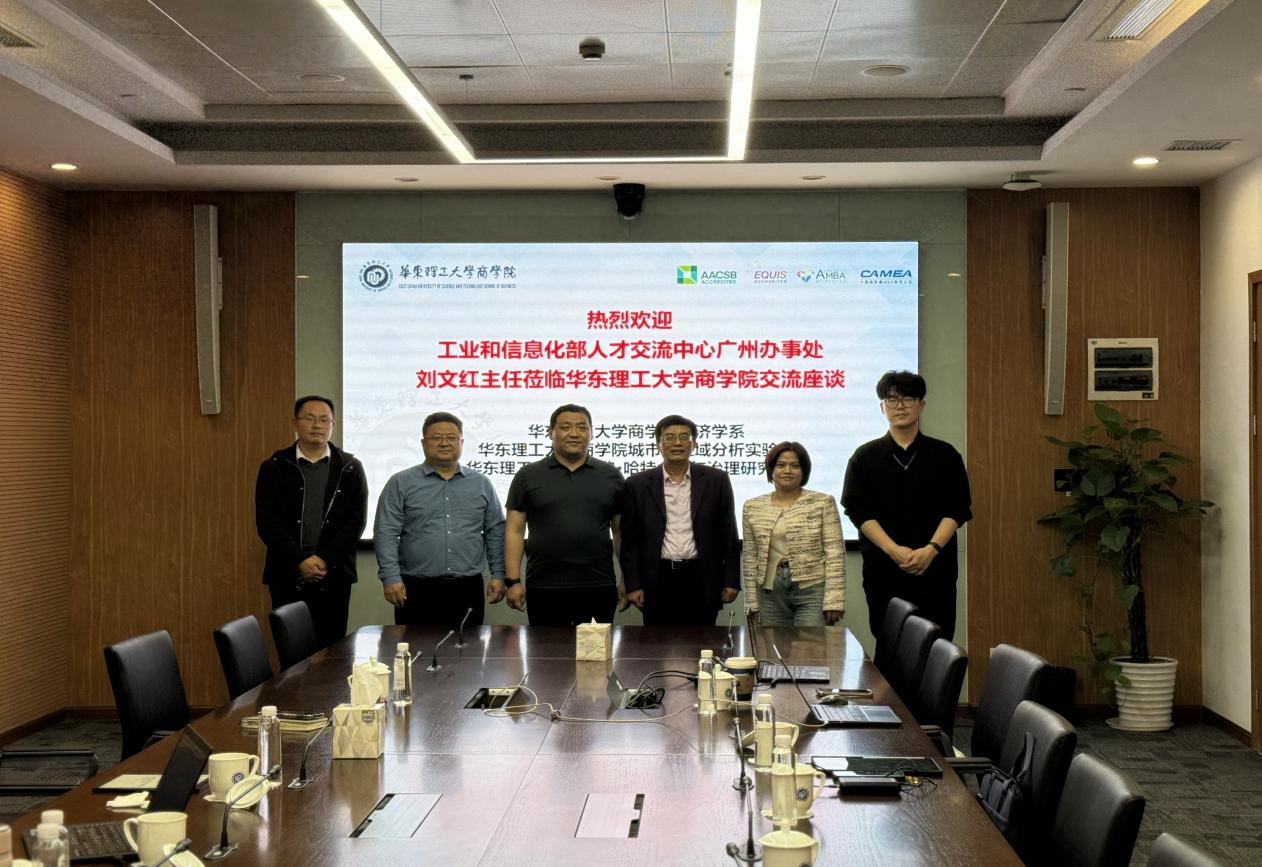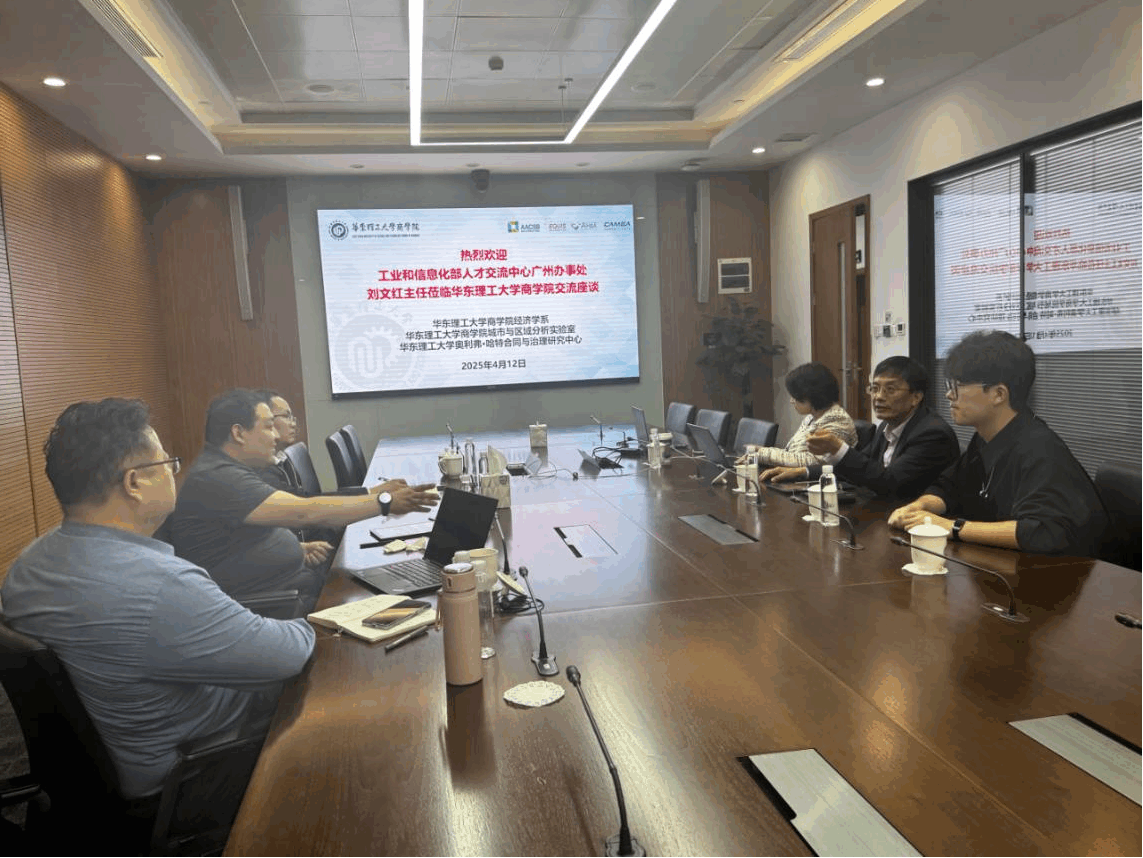Author:哈特中心 Date:2025-04-14
On the morning of April 12, 2025, Director Liu Wenhong of the Guangzhou Office of the Talent Exchange Center of the Ministry of Industry and Information Technology visited the Oliver Hart Center for Contract and Governance Research at East China University of Science and Technology (hereinafter referred to as the "Hart Center"). The two sides focused on topics such as enterprise talent research, training mechanisms, and evaluation standards, and relied on top international cooperation platforms to deepen the integration of industry and education, innovate the training mode of the "Head Goose Talent" plan for enterprise management, and conduct in-depth exchanges and discussions. Oliver Hart and Professor Wu Yuming, Executive Director of the Governance Research Center at East China University of Science and Technology, Dr. Huang Bin, Executive Director of Shanghai Furun Xincheng Technology Co., Ltd., Director Duan Lv of the Long term Collaborative Office of Shanghai Lingang Science and Technology Innovation Center, and Xu Tao, Master of Finance Research at East China University of Science and Technology Business School, attended the meeting.

Professor Wu Yuming, Executive Director of the Hart Center, Director of the Urban and Regional Analysis Laboratory at the School of Business, and Professor of Economics, warmly welcomed Director Liu Wenhong's arrival. He systematically introduced the distinctive advantages of the school, business school, and Hart Center in discipline construction, talent cultivation, scientific research innovation, and social services, as well as the significant advantages of the business school in chemical engineering and technology, materials science and engineering, chemistry, biomedicine and engineering, etc., and innovatively constructed the "Business+Engineering+Science+Technology" (iBEST) integrated education model. He introduced that the School of Business of East China University of Science and Technology has a post doctoral mobile station, three first level discipline doctoral programs and a 5+1 professional degree training system, which ranks top in the QS world university discipline rankings in Chinese Mainland. As one of the first international cooperation platforms in China with a Nobel Prize in Economics and two Nobel Prizes from East China University of Science and Technology, the Hart Center relies on the construction of the "New Humanities" and top international academic resources, focusing on the ESG (Environmental, Social, Governance) research of incomplete contract theory in the digital age. It is striving to build an international collaborative innovation platform for government, industry, academia, and research, gradually forming distinctive characteristics in the fields of enterprise industry park urban and rural regional governance. It is promoting contract and governance research in the context of digital economy and artificial intelligence, and constructing a scientific research and innovative talent integration training model with an international perspective.
Director Liu Wenhong highly affirmed the academic influence of Huali, Business School, and Hart Center, and provided a detailed introduction to the Talent Exchange Center of the Ministry of Industry and Information Technology and the "Head Goose Talent" training program. He pointed out that the Talent Exchange Center of the Ministry of Industry and Information Technology (hereinafter referred to as the "Talent Center") was established in January 1985. It is a second-class public welfare institution directly under the Ministry of Industry and Information Technology, approved by the Office of the Central Organization Committee, registered with the State Administration for the Registration of Public Institutions, and engaged in talent research, training, evaluation, service, and international cooperation. The "Head Goose Talent" training program is jointly implemented by the Ministry of Industry and Information Technology and the State owned Assets Supervision and Administration Commission. Its predecessor was the Leading Talent Project, aimed at enhancing the quality of enterprise management talents. Design courses based on industry and theme, focusing on major national strategies and core elements of enterprise development. As an upgraded version of the leading talent project for small and medium-sized enterprise management, this plan focuses on "entrepreneur cultivation+enterprise cultivation+industry chain integration", and creates a talent service system covering the entire life cycle of enterprises through forms such as "action classrooms", "continuous retraining", and "industry chain research and learning". He emphasized that the "Head Goose Talent" training program will focus on cutting-edge fields such as digital transformation and green and low-carbon development. Through the design of "practical oriented" courses and the "three in one" service model, it will help enterprise managers enhance their strategic thinking and innovation capabilities.
Professor Wu Yuming expressed a positive response to Director Liu Wenhong's vision for cooperation. Both parties have reached the following consensus on the direction of cooperation:
1. Research on Industrial Talents: Based on the disciplinary advantages of East China University of Science and Technology and the industrial and communication resources of the Ministry of Industry and Information Technology, we jointly carry out research on topics such as "Industrial Talent Demand Prediction" and "Digital Transformation Talent Standards" to provide theoretical support for policy formulation and enterprise decision-making.
2. Research on Cultivation and Training: Drawing on the "Action Learning" model of Huali Business School and the "Head Goose Talent" training program resources of the Ministry of Industry and Information Technology, we explore a closed-loop training model of "theoretical learning+return to work practice+achievement incubation" through the Contract and Governance Seminar and Entrepreneur Advanced Training Program under the Digital Economy and AI.
3. Innovation of evaluation mechanism: Actively carry out evaluation opinions on top and high-end talent training models, construct a diversified evaluation system of "innovation value+ability contribution", and strengthen the role of enterprise practice and social contribution in talent evaluation.
4. Service platform construction: Based on the "Industry Talent Information Database", integrate policy, technology, capital and other resources, promote resource sharing, and provide one-stop services for enterprises such as talent supply and demand docking and technology achievement transformation.
5. International Cooperation Expansion: Leveraging award level international cooperation platforms such as the Oliver Hart Contract and Governance Research Center and the Felinga Nobel Prize Scientists Joint Research Center, we will jointly conduct research on cross-border talent development projects and promote the participation of enterprise managers in international industrial cooperation and standard setting.
Director Liu Wenhong stated that the Talent Exchange Center of the Ministry of Industry and Information Technology will fully leverage its advantages in policy guidance and resource integration to support East China University of Science and Technology and the Hart Center in exploring a new model of "university government enterprise" collaborative education in the "Head Goose Talent" training program. Professor Wu Yuming pointed out that the cooperation between the two sides will further deepen the integration of industry, academia, research and application, and provide a "Huali solution" for cultivating globally competitive business management talents.

This meeting has laid a solid foundation for future cooperation between the two sides. In the future, both sides will focus on the strategic needs of building a strong manufacturing and networking country, using the "Head Goose Talent" training program as a starting point, adjusting cooperation details based on market conditions and feedback from all parties, achieving long-term stable cooperation, and jointly helping enterprises improve their talent quality and promote high-quality industrial development.